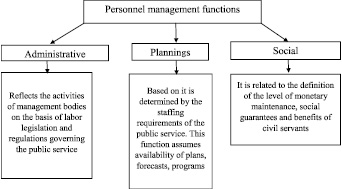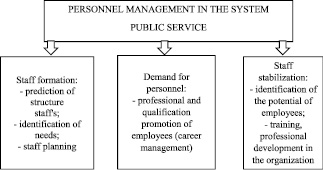Personnel management remains an innovative direction in economic science. Improving the system of personnel management to date is included in the priority strategic goals of development of personnel policy in various spheres of economic activities. Especially sharply this question costs to the state institutions, as at the moment there is a modernization of the civil service system. Adaptation of this aspect for the Institute of public service, which, in turn, is very specific, requires a special approach to the study of the system of work with personnel in a public institution. This is due to the relevance of the topic. Personnel management in the civil service plays a Central role in the personnel management system. Most countries have established public service systems that seek to promote merit, viewing this approach as the best way to effectively deliver public services in the digital economy. In particular, the ideal of public service includes the protection of public servants from arbitrary decisions regarding employment and dismissal, as well as payments that contribute to good governance and the performance of public and municipal employees [2, р. 26]. Modern difficulties in the management of personnel of the authorities are due, firstly, to the complexity of management work in the state and municipal service; secondly, the fact that the staff is the most complex object of management in the state structure; third, the fact that the system of values of employees is changing, which is associated with the tightening of economic restrictions; fourth, the fact that as a result of the growth of the number of personnel, its more effective development and rational use is required. Under these conditions, there is a change in the paradigm of personnel management of public authorities. The system of personnel management goals is changing; the system of interaction between the subject and the object of management is becoming more complicated. The processes taking place in the personnel management system of state bodies require a clearer definition of functions, their analysis and enrichment [6, p. 64]. With regard to the field of personnel management of the public service, it can be considered that the functions are specialized activities of the public authority, its personnel service in relation to the tasks solved in the process of personnel management (table).
Decomposition of personnel management functions
|
Personnel management functions |
|
|
Prediction |
1) the need to provide the organization with the required training and qualifications; 2) development of the system of training, retraining and advanced training of the organization; 4) measures to implement personnel policy in the organization |
|
Regulation |
1) execution of personnel programs and programs for the development of labor and professional resources; 2) the process of formation of the infrastructure of the human resources management system of the organization; 3) ensuring the laws and other regulations on the organization and functioning of the organization |
|
Coordination |
1) activities of the personnel services of the organization on the organization, functioning, development and implementation of personnel policy, formation and rational use of labor, personnel and professional potential; 2) development of draft legal and organizational documents on the organization |
|
Analysis |
1) the state of human and professional potential of the organization; 2) practice of application of the current legislation and normative support of personnel policy in the organization; 3) compliance of the organizational structure of the organization with its goals and objectives |
|
Control |
1) execution and application of legislation on personnel policy; 2) use of human and professional potential of the organization |
|
Labor motivation |
1) formation and application of motivation systems, evaluation of their effectiveness and development of proposals to improve the mechanisms of motivation of staff in the organization |
It is legitimate to single out universal functions, suitable for any process of personnel management of the organization, and specific functions of personnel services of state bodies, their managerial impact on the staff. Universal functions reflect the essence of the management process as a whole, while specific ones are a working tool for the implementation of common universal functions. The specific functions that provide personnel management in the system of state bodies include (Fig. 1).

Fig. 1. Рersonnel management Functions
In the context of the modernization of the civil service, the responsibility of personnel services for the formation of highly qualified apparatus of power and management, effective use of the personnel potential of state bodies increases.
Personnel services of state bodies should have a higher status and be able to influence the formation of the structure of the apparatus, the States, to make proposals to the leadership of the authorities to improve the activities of the apparatus and the service of civil servants. In the personnel services of state bodies should be the most experienced specialists in the field of public service and human resources [1, р. 316]. Their quality shall conform to the requirements of the time (Fig. 2).

Fig. 2. Results of public service personnel management
Currently, the process of personnel management in public institutions is undergoing significant changes. This is due to a number of factors, including the following:
– there is an increase in the complexity of administrative work in the state and municipal service;
– ongoing political and economic reforms in the society change and complicate the system of values of employees;
– the requirements for the rational and efficient use of the personnel of the state institution are increasing due to the increase in the number of employees of the public administration system.
All these factors contribute to the change in the concept of personnel management in a public institution: the system of interaction between the object and the subject of management of a public institution becomes more complex, and the system of goals of personnel management of a public institution changes [1, 2]. One of the main directions of reforming the system of public service of the Russian Federation is the introduction of effective technologies and innovative methods of personnel work [5, р. 49]. As the main tasks related to the sphere of personnel management in the civil service, the following were defined: streamlining and specification of the powers of civil servants, which should be fixed in the official regulations; introduction of effective technologies and modern methods of personnel work aimed at improving professional competence, motivation of civil servants and ensuring conditions for increasing the effectiveness of their professional performance; reduction of excessive number of civil servants with simultaneous attraction on public service of the most qualified specialists and creation of adequate material incentives depending on volume and results of work of public servants; formation and implementation of programs of training for public service and professional development of public servants; development of system of additional professional education of public servants; introduction of modern mechanisms of stimulation of public servants. In the course of the reform, some personnel technologies in the civil service system have been improved, for example, qualification requirements for civil servants in the field of digital technologies have been specified, mechanisms for the replacement of civil service positions on the basis of appointment from the personnel reserve have been developed, a mechanism for the rotation of civil servants has been developed, programs and individual plans for the professional development of civil servants have been introduced [4, р. 284]. Improving the technology of selection and selection of personnel for the civil service will significantly improve the quality and efficiency of the selection of civil servants, will contribute to the formation of high human resources of public authorities. The improvement of the technology of civil servants ‘assessment provides for the introduction of a system of integrated assessment, which involves the addition of the existing technology of civil servants’ certification by the procedures of public assessment of the quality of public services, as well as the evaluation of the effectiveness and efficiency of civil servants (Fig. 3).

Fig. 3. Comprehensive assessment of personnel in the public service
The main purpose of personnel management in the public service is to provide the public authorities with the necessary management personnel, support and development at a high level of his skills, professionalism and competence, the creation of a system of evaluation, motivation, incentives and other necessary conditions for effective, efficient and quality work of managers. The objectives of management of senior personnel in the public service are aimed at the effective use of the potential of managers, and their achievements – to contribute to the improvement of staffing of public authorities.
In the context of the formation of the digital economy of Russia, the responsibility of personnel services for the creation of a highly professional apparatus of power and management, the rational implementation of the personnel potential of state bodies.

